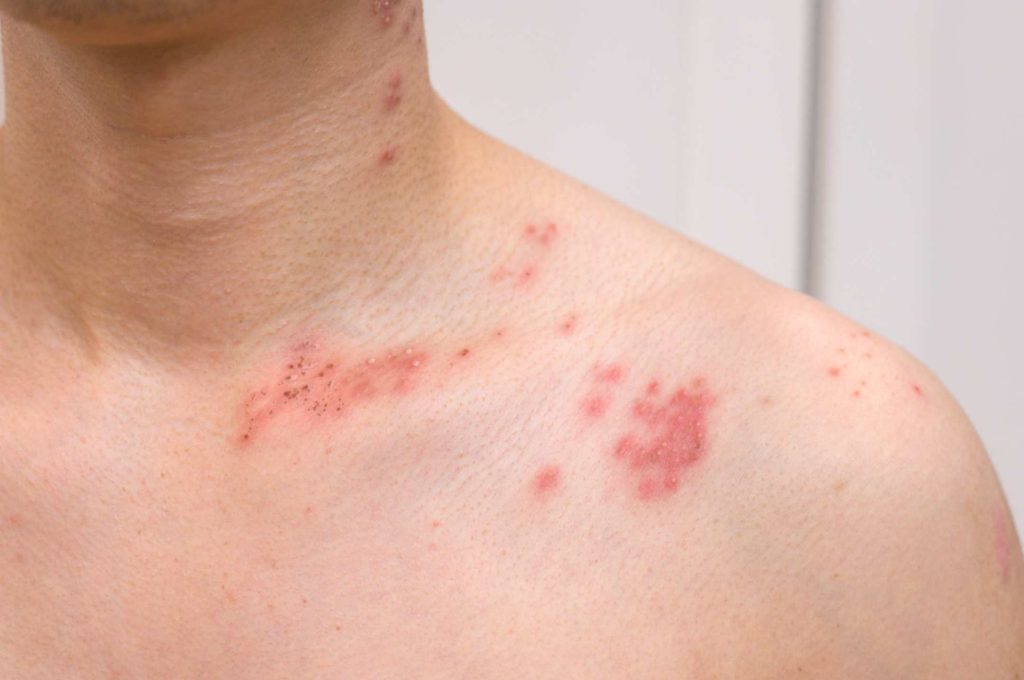
Shingles is a viral infection that affects the skin, causing a painful rash. It is caused by the varicella-zoster virus, which also causes chickenpox. After a person has chickenpox, the virus can remain dormant in the body and reactivate years later, leading to shingles. It typically appears as a rash on one side of the body, often around the chest or face.
What Are the Symptoms of Shingles?
Shingles symptoms and treatment can vary from person to person. There are some common symptoms of shingles to look out for:
1. Pain and Sensitivity: Before the rash appears, many people experience pain, itching, or a burning sensation on the skin. This pain may feel like a sharp or throbbing ache.
2. Red Rash: A few days after the pain starts, a red rash usually develops in the area where the pain is felt. The rash can turn into blisters, which may break open and crust over in a few days.
3. Tingling or Numbness: Some people experience a tingling or numb feeling in the area before the rash shows up. This can often feel like pins and needles.
4. Flu-like Symptoms: Shingles can sometimes cause fever, headache, fatigue, and an upset stomach, similar to flu symptoms.
5. Blisters: The rash will form into blisters that may burst and form scabs. These blisters can be very painful, and sometimes, the pain can continue even after the rash heals.
6. Postherpetic Neuralgia: This is a common complication where pain persists even after the rash has healed. It can last for weeks or even months, making the area extremely sensitive.
What Causes Shingles?
As mentioned earlier, shingles is caused by the varicella-zoster virus, the same virus responsible for chickenpox. Once someone has chickenpox, the virus remains in the body, lying dormant in the nerve tissues. Years later, for reasons not fully understood, the virus can become active again and cause shingles. This is more likely to happen when the immune system is weakened, which can occur due to stress, illness, or age.
Older adults, particularly those over 50, are more likely to develop shingles. People with weakened immune systems, such as those undergoing cancer treatment or living with HIV/AIDS, are also at greater risk.
Best Treatment for Shingles Pain
If you think you have shingles, it’s important to see a healthcare provider as soon as possible. Early detection of shingles symptoms and its treatment can help reduce the severity of symptoms and prevent complications. Treatment typically focuses on managing pain and speeding up recovery.
1. Antiviral Medications: The first step in shingles treatment is usually antiviral medications. These help to reduce the activity of the virus and can speed up the healing process. Examples of antiviral drugs commonly prescribed for shingles include aciclovir, valaciclovir, and famciclovir.
2. Pain Relief: Pain relief is a key part of shingles treatment. Over-the-counter painkillers like paracetamol or ibuprofen can help manage mild pain. For more severe pain, stronger pain relievers or even prescription painkillers may be necessary.
3. Corticosteroids: In some cases, corticosteroids are prescribed to reduce inflammation and swelling, especially if the shingles affect the eyes or ears.
4. Antihistamines: These can help relieve itching caused by the rash.
5. Cool Compresses: Applying cool compresses to the affected area can soothe the skin and reduce pain.
6. Vaccination: If you are over 50, getting the shingles vaccine (Zostavax or Shingrix) can reduce the risk of getting shingles and help prevent long-term complications like postherpetic neuralgia.
How Long Does Shingles Last?
Shingles typically lasts between two to four weeks. The rash usually crusts over and heals within this time. However, the pain can sometimes linger for weeks or even months, especially in older adults.
How to Prevent Shingles?
While shingles cannot always be prevented, the shingles vaccine can reduce the chances of developing it. This vaccine is recommended for people aged 50 and older, even if they have already had shingles. If you have never had chickenpox, it is important to get the chickenpox vaccine, as this will lower your chances of getting shingles later in life.
Book an Appointment Today for Expert Shingles Treatment
Are you living in or around Slough and need shingles treatment? Contact Aroga Pharmacy in Farnham Common for expert care and advice. Our team is here to help you manage your shingles symptoms and provide you with the best treatment options available. Book your appointment today and take the first step towards relief from shingles pain!
